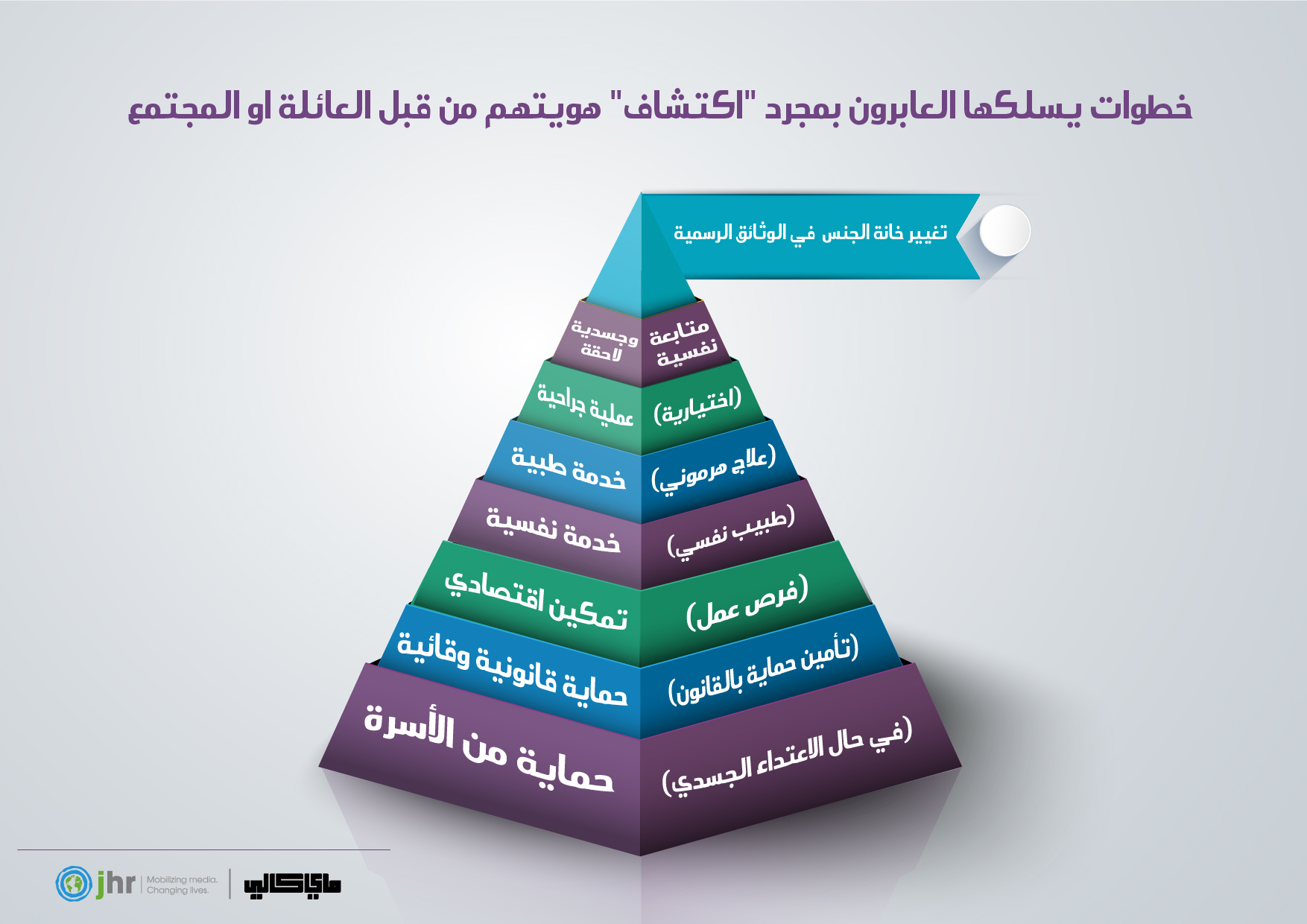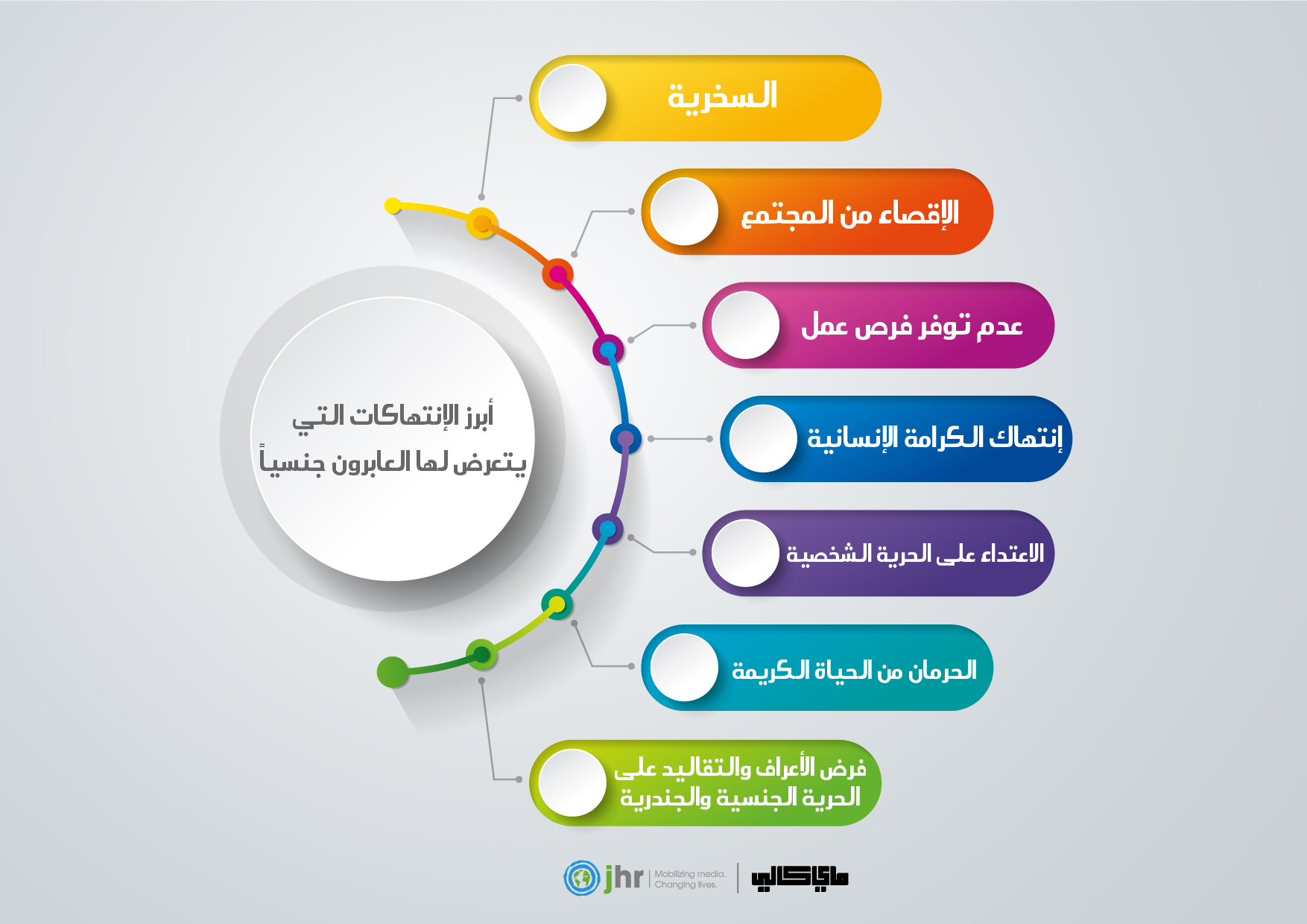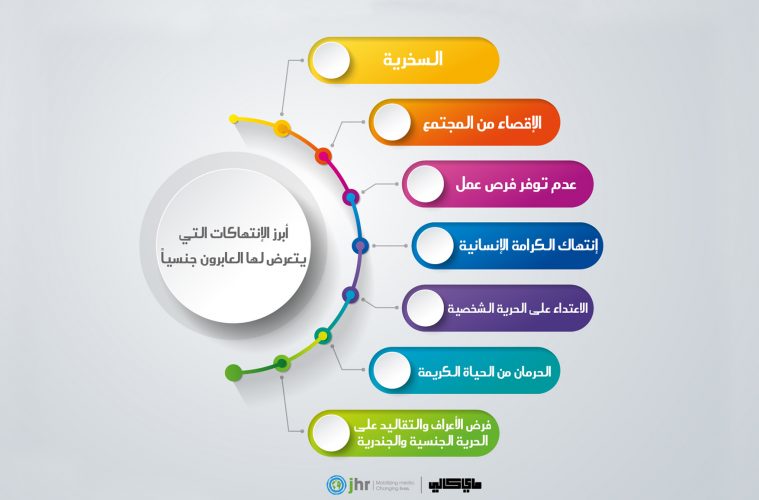المقال بالعربي هنا
Written by Hiba Abu Taha*
Translated by Ayyam AlSafadi
For most of his life, Muna (whose name has been changed) never accepted himself. His feminine features bothered him the more his maturity became visible. He spent years lost between violence and ostracization.
When Muna met with the reporter, he started to describe the difficult days he had filled with fear, humiliation, frustration and insults, as he was discussing his gender identity.
He struggled with the little community surrounding him, starting with his school and friends, and then with his officer father, who did not separate his work in security from his role as the head of the household. He extended his influence and power from his position at work to his home, where Muna was subjected to the worst kinds of torture, including extreme physical beating.
Muna is not the only one who has suffered on his transition journey. There are many people like him in Jordan, those who are unable to seize their right to determine their identity because of restrictions from religion, social norms, and more recently, the law.
Social Struggle
“Why should we lose the people we love just because we are different than they are? Why do they stand between us and the fulfillment of ourselves and our freedom?” wonders Reem, who would like to transition to male.
Reem did not speak randomly. Their comments were the result of society standing between them and their right to determine their gender. Reem told us with sadness that “…we [transgender men and women] are not causing society’s destruction. We are part of society, and by entrenching freedoms we will build it together.”
Human rights activist Lina Jazrawi attributes society’s negative views towards transgender men and women in Jordan to prevalent social norms. The Jordanian society is conservative and does not accept any form of behavior that is not perceived to be ‘normal’. Anything outside the norm is considered a violation of religion and traditions. For many, this is sufficient cause to reject them.
Advocate Leen Al Khayyat agrees with Al Jazrawi on society rejecting transgender men and women: “We are faced with a case of failing to respect the privacy of individuals and their right to choose their gender, because we do not keep up with the developments in sexual life. This society is generally religious and conservative; therefore, not all individuals can enjoy their full rights, such as their right to choose their gender, because most groups in society disapprove of them. The acceptance of Trans people cannot be imposed on society”.
The founder of specialized LGBTQ My.Kali Magazine, Khaled Abdul Hadi, rejects this point. He says, the “LGBTQ community is an integral part of the Jordanian society, they are citizens and they must be treated equally with others, and they must be granted their rights”.
In Jordan, an individual does not entirely own the decision to change their gender themselves, as a transition requires outside approval. A physician will not perform the sex reassignment surgery unless it complies with the medical constitution and the laws regulating their work.
Ideally, it should be up to only the individuals themselves to make the decision, according to psychologist Basel Al Hamad, “as they are most suited to determine their needs, and have the right to determine their sexual identity and the means of expressing it.”
Al Hamad notes there is a great misunderstanding and ambiguity regarding the circumstances of transgender men and women in the country, which reinforces their lack of acceptance in Jordanian state and society and physicians who perform sex reassignment surgeries.
Writer and editor at My.Kali, Mousa Shadidi, believes that the rejection of the LGBTQ community and the interference in individuals’ bodies can be described as “physical colonization.” Sexual transition is recognized by science, but the rejection of requests for sex reassignment surgeries restricts the individuals’ freedom over their body. “We live in a patriarchal society that gives its members the power to control us, which we consider real colonization. Thus, we will struggle to liberate our bodies”.
Egregious abuse
Muna was forced to wear girls’ clothes and paint his fingernails. The problem grew when his father discovered his relationship with a girl that he loved. His father beat him, which led to his decision to flee his parent’s home, to “escape from hell”.
Maya shares a similar story. She is transitioning from male to female, even though her family has not accepted her decision nor have they understood her suffering. “Ever since I was a child, I rejected myself as a male. For years I was silent and did not express my feelings, until I got to the point where I had to express myself. I got to the point where I either die or face everyone and start the transition process”.
Transgender men and women face oppression, especially from their families, according to Shadidi. “The initial perpetrator of the abuse of their rights is the family, as most of them suffer beatings, torture, and eviction from their homes”.
Shadidi told the story of a female who wished to transition to a male, but was threatened by her brother who said he will kill her if she did not change her mind. She resorted to the Family Protection Directorate, which failed her. Shadidi stressed that incidents like these are repeatedly experienced by members of the LGBTQ community, especially males wishing to transition to female. They are ridiculed, and their desires are typically met with responses like “let’s imprison you”. He stressed that there are repeated cases of detention for those with sexual identities that are considered to be ‘abnormal’, especially those who are poor and do not have the money to consult a psychiatrist and obtain reports describing their case that can be used with police officers. These reports guarantee them legal protection.
Muna escaped with his lover from the abuse and oppression of their families leaving their local governorate for Amman. Because they were minors, their families were able to report them to the relevant authorities. After 22 days of searching, the security forces found and detained Muna and his partner. The officer at the police station refused to refer them to the Family Protection Directorate. According to Muna, they were also abused and insulted while in detention.
He adds “A day after they took us to the police station in the governorate where I live, and then on to the administrative governor. I decided to surrender and go back home for a simple reason: it is easier for me to accept insults and beatings from my father than from a stranger”.
The rights of transgender men and women in Jordan are routinely violated, which is against Article 7 of the Jordanian constitution that guarantees personal freedom. Article 8 also prohibits the detention or imprisonment of any person in violation of the provisions of the law. The International Covenant on Civil and Political Rights stressed the protection of such freedom in its articles, with Article 7 stipulating, “No one shall be subjected to torture or to cruel, inhuman or degrading treatment or punishment.”
Psychological War
Muna told us that in spite of the oppression by his father, he agreed to undergo medical tests, which did not reveal any hormonal abnormalities in him. He then moved on to a secondary evaluation with a psychiatrist, and he agreed to go, asking them “I do not know who I am, I want to know if I am male or female, why am I not attracted to males, who am I?”
“What I remember was that the psychiatrist was very nervous,” he recounts, “and I firmly believe he needed therapy himself. I will never forgive him for the horrific way he treated my case”.
The physician referred Muna to a Psychiatric Hospital for Mental Illness. He says, “I felt that I was in a large prison, I could not talk to anyone because everyone was crazy. Additionally, there were repeated insults by the physician. He made me sit in a room among trainee students and provoked me with his questions in front of them. They would then mock me.”
Maya had a similar experience with a physician that was monitoring her hormones. She told us, “The physician treated me with tact and was very nice. After my parents went to her clinic she changed completely, she started to treat me badly; she would not even smile back at me.”
Maya attributes the change in the physician’s behavior to the psychological pressure her family placed on the physician. It is not uncommon for physicians to be subjected to threats by the parents of transgender men and women in Jordan.
Often physicians succumb to these social pressures and norms, according to psychologist Al Hamad, more than they abide by professional ethics that mandate medical professionals provide assistance and alleviate the suffering of people as people, without considering any other image, religious or social considerations.
The physicians do not trust the patients, and some want to impose ready-made formulas on transgender men and women, presumptively defining what is ‘right/normal’ and what is ‘wrong/abnormal’ behavior. “Thus, they are violating the essence of psychiatric therapy which is based on individual freedom. The importance of the psychological world, understanding the person and their right to determine their fate and formulate their own lives” adds Al Hamad.
Here, reference must be made to Article 1 of the Jordanian Medical Constitution, which stipulates:
“The medical profession is a humanitarian, ethical and scientific profession which is as old as mankind. Over time, it acquired traditions and standards that necessitate that those who practice must respect the human personality in all circumstances. They are role models in their behaviors and honest in their work, protecting the lives and honor of people, with mercy and humility, exerting all efforts to serve them. The medical responsibility between the physician and the patient is based on offering care and refraining from negligence, and not healing”.
When questioned, the Ministry of Health nominated Dr. Abdul Hadi Breizat, as its representative on this portfolio. He did not respond to submitted questions, and instead referred us to the requirements of the Medical Responsibility Law in which the involvement of physicians does not go beyond sex reassignment surgeries for those who suffer from genital birth defects.
The Law
Last April, the Jordanian Parliament passed the “Medical Responsibility Law” which stipulates in Article 22, “Anyone violating the provisions of paragraph H of Article 8 of the same Law shall be punished by temporary hard labor for no less than 3 years and no more than 10 years”. The paragraph prohibited “service providers to conduct sex reassignment surgeries”.
Advocate Al Khayyat commented on this saying: “Considering sex reassignment surgeries as a crime raises an important point in our penal legislation that allows for punishment to be made harsher. Harsher criminalization is being prioritized over acceptance. This is very dangerous and does not entrench the rule of law instead it leads to a vengeful society”.
Maya believes there is no difference between sex reassignment surgeries allowed by the Medical Accountability Law and the transition surgeries that have been criminalized. She added “We want to correct and amend our gender not change it, so there is no difference between the two cases”.
Meanwhile, Ministry of Health representative, Breizat tells us that each case must be filed and individually evaluated by a specialized committee made up of a surgeon, reproductive specialist, neurologist and psychiatrist to determine if a person requires a sex reassignment surgery.
In a landmark 2014 case in Jordan, the Court of Cassation set a judicial precedent ruling on case number 2092/2014. The Court agreed to change the name of an individual who transitioned from male to female.
According to the case file, the plaintiff felt they were more female than male ever since they were a child. The plaintiff travelled to Australia and, after finishing university, their case was presented to a committee of specialists who decided to use hormonal treatment and then, perform a sex reassignment surgery.
Religions: No Consideration of Psychological Tendencies
The Islamic Fatwa Department did not respond to our questions. They, instead, provided a copy of their fatwa number (245) (14/2017) which states:
“If someone is afflicted with a dual gender disorder, this disorder must be treated so that things go back to their original order, and so that it is in line with the origins of masculinity or femininity that are clear in the reproductive system, and not by amending gender and changing it with sex reassignment surgery and removal. The psychological disorder cannot be used as the judge when the physical evidence is clear. Psychological ‘tendencies’ cannot be considered in this case either”.
They referred to verses 117 to 121 of the Surat Al Nisa (Women). They concluded the fatwa by saying, “Consequently, reproductive transition and removal operations are prohibited to treat what is identified as the sexual identity disorder.”
Moreover, the Director of the Catholic Studies and Media Center, Father Rifat Bader, said that sex reassignment surgeries “are not permitted” and people must accept how God created them, whether they are male or female, and they should not manipulate God’s creation.
According to Father Rifat, the church respects ‘psychiatric medicine’ and does oppose it, but it advises using treatment and gradual self-acceptance to help people. He stated that wishful thinking is different than reality and cannot go so far as to normalize sex reassignment surgery. He did agree with presenting cases to specialists including doctors and men of religion. If there is proof of a reasonable, scientific, medical and moral reason then each cases can be individually viewed.
Psychologist Basel Al Hamad believes that psychiatric motives “are stronger than biological and hormonal factors. In psychiatric treatment, we assess the problems as viewed by those who are going through them, as they affect their lives. Not according to a preconceived social standard.”
Al Hamad added that the psychological battle is first personal, and then it is with society. In his opinion, gender identity should not be a battle with religion. Religion does not determine if you are male or female based on your appearance; it is determined by your upbringing. However, Al Hamad feels it is important that an individual’s own identification and orientation must first play a role in the determination of their sexual and gender identity.
The signs of masculinity appeared clear on Muna, including facial hair and the complete removal of their breasts. He is moving towards self-fulfillment and transitioning to a complete male body, shedding a female body to which he does not belong in a Jordanian society that rejects the passage.
This story was mentored and supported by Journalists for Human Rights’ program in Jordan.

